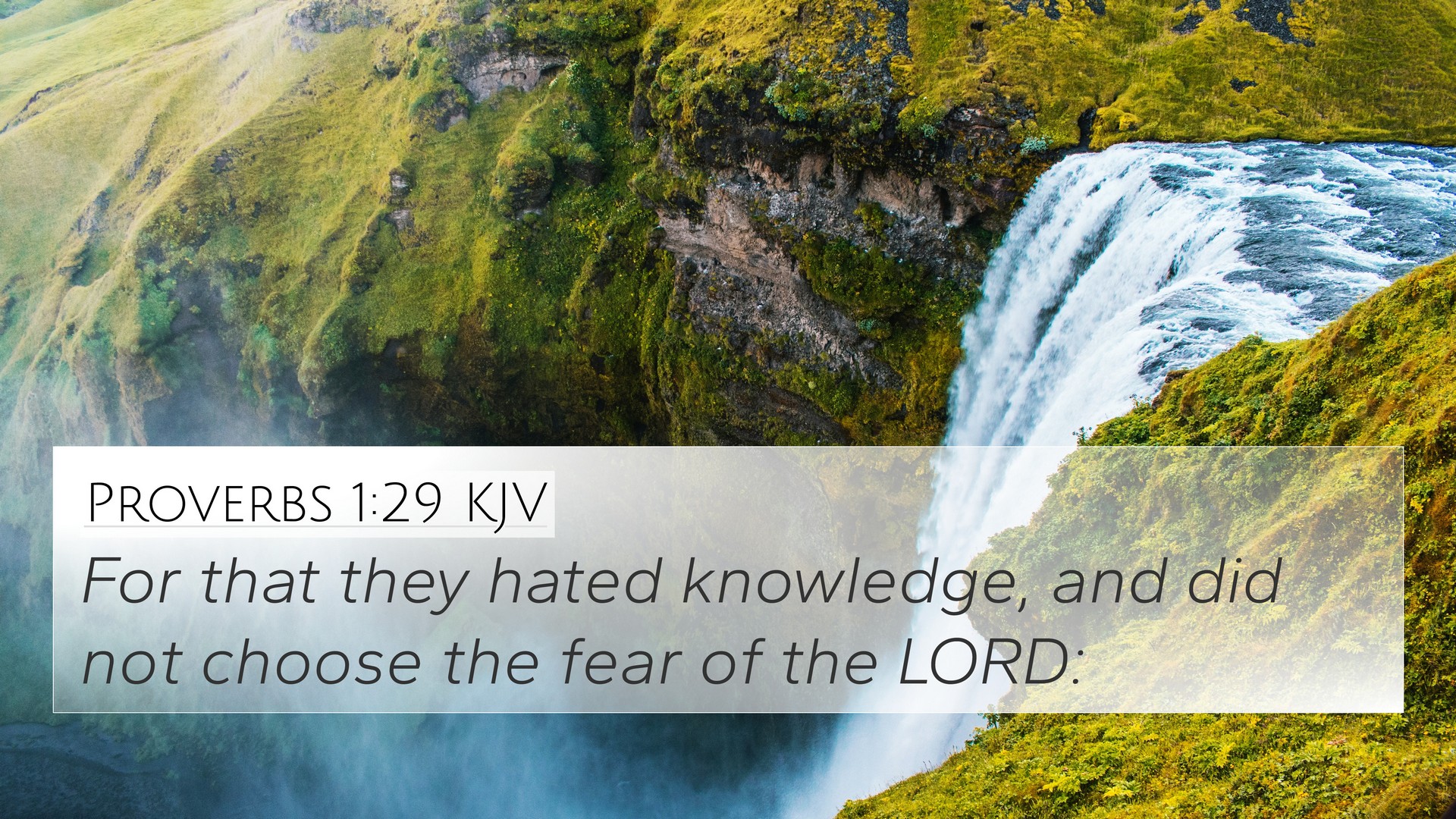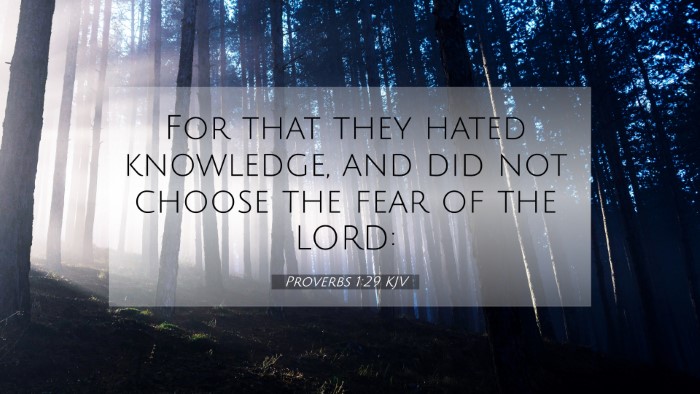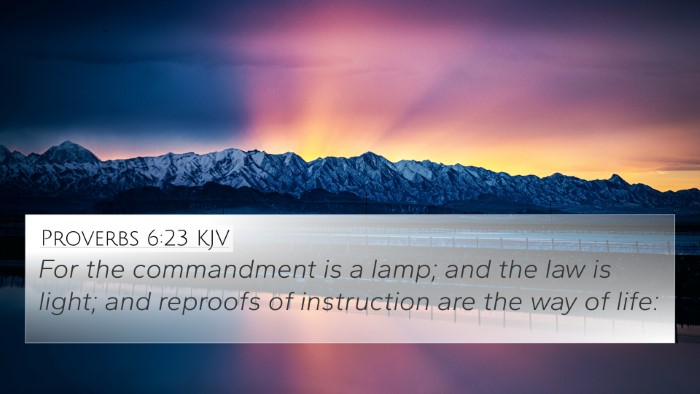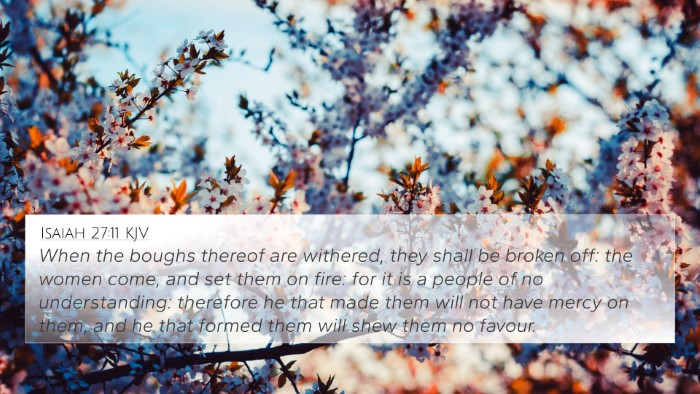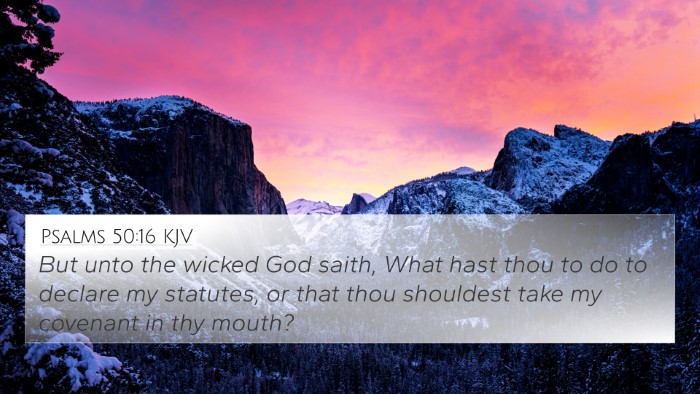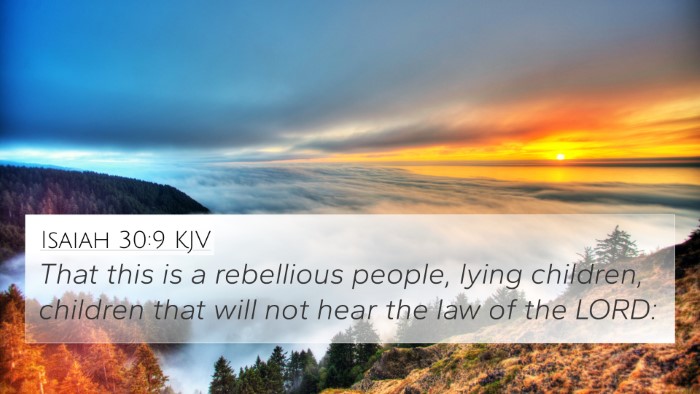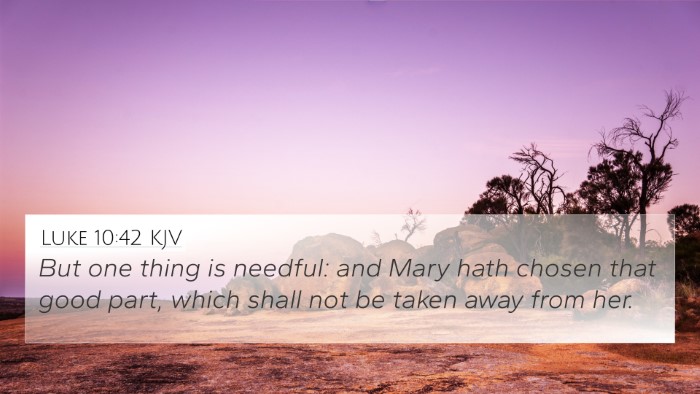Understanding Proverbs 1:29
Proverbs 1:29 states, "For that they hated knowledge, and did not choose the fear of the LORD." This verse encapsulates the consequences of rejecting divine wisdom and illustrates the broader theme of wisdom in the Book of Proverbs.
Meaning and Interpretation
According to Matthew Henry, this proverb highlights the natural outcome of disdain towards knowledge. Rejecting knowledge equates to disregarding the moral and spiritual foundation essential for living a righteous life. Henry emphasizes the importance of the "fear of the LORD," which indicates a reverent respect towards God—a foundation for acquiring wisdom.
Albert Barnes expands on this by noting that the "hate" towards knowledge showcases a heart bent on folly. He specifies that those who refuse God's wisdom are susceptible to the consequences of their ignorance, even to the point where they face destruction. The term "fear of the LORD" is crucial; it encapsulates the beginning of wisdom and forms the basis for all spiritual understanding and moral clarity.
Adam Clarke offers an insight into the societal implications of this verse, suggesting that when knowledge is despised, it not only affects individuals but can lead to societal downfall. Clarke asserts that the fear of God, rooted in knowledge, is essential for both personal virtue and societal order. He articulates that those who neglect this fear are, in essence, rejecting the only true safeguard against error.
Cross-References and Connections
This verse connects to several other biblical texts that reinforce the themes of knowledge and the fear of the LORD:
- Proverbs 2:1-5: This passage encourages the pursuit of wisdom and the importance of seeking understanding, directly contrasting the attitude described in Proverbs 1:29.
- Proverbs 9:10: "The fear of the LORD is the beginning of wisdom," reinforcing the idea that knowledge begins with reverence towards God.
- Hosea 4:6: "My people are destroyed for lack of knowledge," illustrating the consequences of ignoring divine instruction.
- Romans 1:21: This New Testament verse highlights humanity’s rejection of God’s knowledge, mirroring the sentiments expressed in Proverbs 1:29.
- 1 Corinthians 1:18-25: This passage discusses the wisdom of God compared to human wisdom, and how many despise God’s wisdom as foolishness.
- James 1:5: "If any of you lacks wisdom, let him ask of God," highlighting the importance of seeking divine guidance.
- Proverbs 3:7: "Do not be wise in your own eyes; fear the LORD and depart from evil," echoing the theme of humility before God as essential to wisdom.
- Psalm 111:10: "The fear of the LORD is the beginning of wisdom; a good understanding have all those who do His commandments," reinforcing that wisdom is linked with obedience to God.
- Isaiah 33:6: Offers insight into the stability that comes from wisdom and knowledge as the foundation of peace.
- Colossians 2:2-3: Paul writes about Christ, in whom are hidden all the treasures of wisdom and knowledge, linking New Testament truths with the Old Testament's emphasis on divine instruction.
Thematic Connections
This verse and its associated scriptures establish thematic connections regarding knowledge, wisdom, and the fear of the LORD—a comprehensive framework for understanding biblical teachings:
- Wisdom Versus Folly: Proverbs consistently contrasts wisdom with folly, urging the reader towards prudent living.
- The Role of Knowledge: Knowledge is presented as vital for spiritual growth and moral integrity throughout scripture.
- Divine Instruction: Many verses remind believers that divine wisdom comes through learning about and fearing God.
- Consequences of Rejection: The weight of rejecting wisdom is emphasized throughout Proverbs, warning of the dangers of ignorance.
- Interconnectedness of Scripture: The cross-references reveal how the entirety of Scripture dialogues on wisdom and knowledge, forming a cohesive teaching.
Tools for Bible Cross-Referencing
For those interested in further exploring Bible verse connections, several tools and methods can assist:
- Bible Concordance: A valuable resource for finding specific verses and themes related to knowledge and wisdom.
- Bible Cross-Reference Guide: Provides a structured way to uncover connections between scriptures.
- Cross-Reference Bible Study: Engaging with scripture through cross-referencing deepens understanding and insight.
- Bible Chain References: These guide readers through related verses in a cohesive thread.
- Comprehensive Bible Cross-Reference Materials: Useful for in-depth study and sermon preparation, allowing exploration of thematic connections.
Conclusion
In summary, Proverbs 1:29 serves as a poignant reminder of the consequences inherent in rejecting knowledge and the fear of the LORD. This verse, along with its many cross-references, illustrates a profound truth: true wisdom originates from acknowledging God. By engaging with these interconnected scriptures, readers can cultivate a deeper understanding of biblical themes, enriching their spiritual journey and discerning the wisdom woven throughout scripture.
